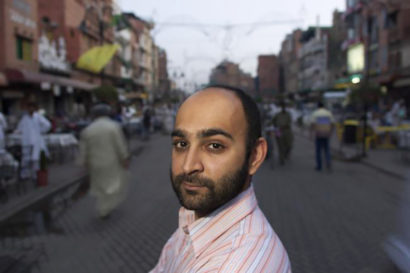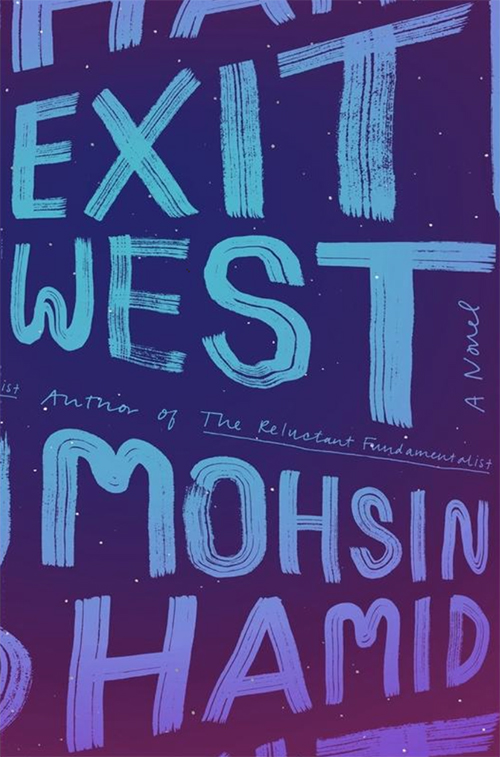‘Exit West’ author Mohsin Hamid: ‘Migration is what our species does’
Incoming students read Hamid's 2017 novel about the sacrifices and beauty of migration as part of On the Same Page, a program of the College of Letters and Science

September 1, 2020
Imagine a reality where migration didn’t involve a journey, and instead, anyone could simply walk through a door and be in another country. That’s what author Mohsin Hamid does in Exit West, his 2017 novel that tells the story of two characters — Saeed and Nadia — who meet and fall in love as their country breaks out in a civil war. After discovering that magic doors are popping up throughout their city that could transport them to a different country, the couple decide to leave their home and forge a new life together in an unknown place.

Incoming students read Mohsin Hamid’s 2017 novel Exit West as part of On the Same Page, a program of UC Berkeley’s College of Letters and Science. (Photo by Ed Kashi)
As part of On the Same Page, a program of UC Berkeley’s College of Letters and Science, all 8,700 incoming first-year and transfer students got a copy of the novel to read over the summer, so when they started at Berkeley in the fall, albeit virtually, they would have something in common to talk about — socially, in classes and at events designed to explore the book’s themes.
Berkeley News caught up with Hamid after he delivered his virtual keynote speech to the Berkeley community from Lahore, Pakistan, where he was born and has spent about half of his life. In the following Q&A, he discusses the sacrifices and beauty of migration, and how the human need to move around the world is an opportunity for us all to build something new, together.
Berkeley News: Can you explain how you began to think about writing Exit West? What was happening in your life and in the world at the time?
Mohsin Hamid: I was living in Lahore, an ancient city in southwest Asia, and I was watching other ancient cities in southwest Asia being consumed by violence and war: Kabul, Baghdad, Damascus, Aleppo. I worried about something like that happening where I lived, being forced to flee. At the same time, I was teleporting through black rectangles on a regular basis, the screens of my phone and computer, on video calls and while watching television and films. And those two impulses came together and were a large part of the impetus to write this book.
Saeed and Nadia are very different — he’s religious and feels connected to his culture, and she feels oppressed by it. What was the purpose of bringing these two characters together to tell the story of their migration?
Saeed is more nostalgic in temperament: He looks back to his childhood, to the past, as a model of where he wants to be. Nadia is more resolutely future-looking: She looks ahead, and doesn’t want to look back. We all have these two tendencies within us, to varying degrees, and to degrees that change at various times in our lives. And, of course, Saeed and Nadia have both tendencies, too — neither is fully one nor the other. Bringing these two characters together was a chance for me to explore the tensions of these two views, tensions I feel myself.
When the city that Nadia and Saeed live in becomes dangerous after militants overthrow the government, the couple hear about the magic doors — portals that anyone can use to travel to and from different countries without having to cross national borders. Some are easier to go through than others, but being able to merely step through a door to a new life is so much different from how migration is today. Do these doors change what it means to migrate and to be a migrant in a new country? What does it say about current migration systems that exist around the world?
It could be as easy as stepping through such doors — it costs so little to move a person around the world. It is our choices that have made it difficult for people to move. The doors are already there: We have simply locked them and made them dangerous. I think we use the journeys of migrants to place them in a different category (“I never crossed the Mediterranean in a small rubber boat; this is a different kind of human from me.”) Take away the journey, and you have a person who was in one place, and now is in a different place, something that happens to all of us — when we leave our parents’ homes, for example. I don’t intend to minimize the dangers and difficulties of migration with the doors. I intend to minimize the strength of our instinct to treat our fellow humans as “other.”

Exit West tells the story of Saeed and Nadia, who meet and fall in love as their country breaks out in a civil war. After discovering that magic doors are popping up throughout their city that could transport them to a different country, the couple decide to leave their home and forge a new life together.
The story takes place in four different locations: an unnamed city during a civil war; Mykonos, Greece; London, England; then, finally, Marin, California, where Nadia and Saeed eventually feel most at home. Why did you choose each of these cities, and what do they, as a whole, represent in the story?
Each of these places has been important to me in my own life. The unnamed city where Saeed and Nadia begin their story was based in many ways on Lahore, where I have lived half my life. I have been visiting the Greek islands since the summer I graduated from college, almost 30 years ago. London was my home for the better part of a decade, and so was the Bay Area in California. The novel isn’t an autobiography, plot-wise, but it is, in some senses, geographically autobiographical.
Right before the couple leave their city, you write “when we migrate, we murder from our lives those we leave behind.” Do you think this is necessary, or inevitable — that, in order to start a new life somewhere else, you need to accept a certain metaphorical, or sometimes even literal, death of people who don’t come with?
Migration is painful, and the emotional violence that we do to our relationships when we migrate is what I was getting at here. When I think of leaving my parents in Pakistan, who live next door, and moving far away, I feel there is real emotional harm that has to be reckoned with. This is the price every migrant pays when we migrate, and why it is false to imagine that migrants have made no sacrifices for their new homelands. They have sacrificed enormously.
When the couple are in London, the government’s resettlement plan shows that there is no fair solution for human displacement — someone always loses something. In interviews, you have said that people will continue to want to move to countries that are safer and more economically stable, and that “we need to figure out how to build a vision for this coming reality that isn’t a disaster, that is humane and even inspiring.” What might that look like, to you?
A great global migration is underway and, in fact, has been for millennia. What we must resist is the idea that this is not the case, that migration is something new, unprecedented, dangerous, bad. Migration is what our species does, what humans need to do. We need to see the beauty and potential in this. Migration needn’t be like a squatter seizing our home. It can be more like an adoption, the forging of a new family where previously there wasn’t one. To succeed, it requires effort from both sides. But above all, it requires a spirit of building something new, something better, and building it together.
For On the Same Page, incoming Berkeley students read Exit West over the summer. What kinds of conversations do you hope your novel sparks?
There isn’t something in particular that comes to mind. I write half-novels. Each reader, in reading them and animating them in their imagination, makes their own novel. They take letters and punctuation marks and make feelings and images and smells and sounds and people. It is for the reader to decide what they have found, and what they want to discuss.
While you were writing Exit West, did you learn anything about your own beliefs that you hadn’t realized before?
So many things. Writing a novel is a journey — it is living a life in a different way, puzzling things out in a different way. I learned a great deal — about the importance of trying to let go well, for example.
Is there anything you’d like to add that I didn’t ask about?
It was a great pleasure to speak (virtually) at Berkeley. I’ve always admired the university for its public, radical spirit. For a little boy who grew up on the Bay and then migrated away, it felt like life coming full circle.